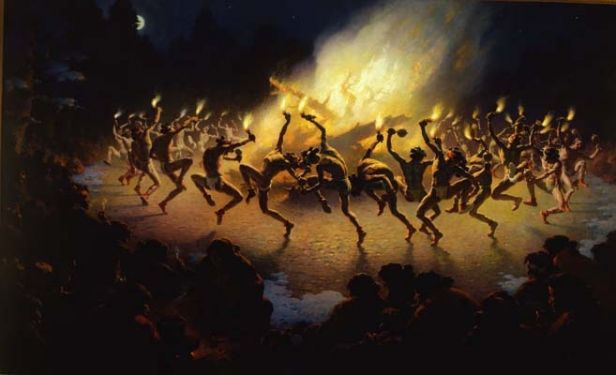Edited by Sophie Paisley

And now I must part with that little company I had. Here I parted from my daughter Mary (whom I never saw again till I saw her in Dorchester, returned from captivity), and from four little cousins and neighbors, some of which I never saw afterward: the Lord only knows the end of them. Amongst them also was that poor woman before mentioned1, who came to a sad end, as some of the company told me in my travel: she having much grief upon her spirit about her miserable condition, being so near her time, she would be often asking the Indians to let her go home; they not being willing to that, and yet vexed with her importunity, gathered a great company together about her and stripped her naked, and set her in the midst of them, and when they had sung and danced about her (in their hellish manner)2 as long as they pleased they knocked her on head, and the child in her arms with her. When they had done that they made a fire and put them both into it, and told the other children that were with them that if they attempted to go home, they would serve them in like manner. The children said she did not shed one tear, but prayed all the while. But to return to my own journey, we traveled about half a day or little more, and came to a desolate place in the wilderness3, where there were no wigwams or inhabitants before; we came about the middle of the afternoon to this place, cold and wet, and snowy,4 and hungry, and weary, and no refreshing for man but the cold ground to sit on, and our poor Indian cheer.
Heart-aching thoughts here I had about my poor children, who were scattered5 up and down among the wild beasts6 of the forest. My head was light and dizzy (either through hunger or hard lodging, or trouble or all together), my knees feeble, my body raw by sitting double night and day, that I cannot express to man the affliction that lay upon my spirit, but the Lord helped me at that time to express it to Himself. I opened my Bible to read, and the Lord brought that precious Scripture to me. “Thus saith the Lord, refrain thy voice from weeping, and thine eyes from tears, for thy work shall be rewarded, and they shall come again from the land of the enemy” (Jeremiah 31.16)7. This was a sweet cordial to me when I was ready to faint; many and many a time have I sat down and wept sweetly over this Scripture. At this place we continued8 about four days.
Works Cited:
The Bible. King James Version. Bible Gateway, https://www.biblegateway.com/passage/search=deuteronomy+28&versionKJV. Accessed 30 October 2020.
Thanks to Project Gutenberg for providing the digitized version of this text free of charge. Without their generosity, this project would not be possible.
Rowlandson is referring to Joslin, the pregnant goodwife who received mention in the Third Remove. ↩
By including this anecdote in her narrative, Rowlandson effectively dehumanizes and demonizes her Native American captors, and alludes to the notion that they partake in ungodly activities. During the time period in which Rowlandson was held captive, it was not uncommon for Native Americans to be viewed as “heathens” by the English. For a more in depth analysis regarding Rowlandson’s portrayal of her captors, see this blog post. ↩
Rowlandson does not name the location mentioned here, however this interactive map speculates that during this remove, Rowlandson and her captors came upon the town of Petersham, MA. ↩
Rowlandson often complains about the cold temperatures, and unfavourable weather conditions during her captivity, which took place during the early months of spring in Massachusetts, where it is not uncommon for temperatures throughout the day to be near freezing, and below freezing throughout the night. ↩
The use of the word “scattered” here may be Rowlandson referring back to Deuteronomy 28, where one of the Lord’s punishments for those who don’t follow his commandments is to “ scatter thee among all people, from the one end of the earth even unto the other” (King James Version, Deuteronomy 28:64). If Rowlandson is using “scattered” in that context, then it is interesting to note that she uses it while describing her own children. ↩
The “wild beasts” Rowlandson is referring to here aren’t actually woodland animals, they are her captors. The use of this phrase added to the pre-existing stereotype that suggested that Native American people were not people at all, but instead dangerous animals who possessed no sense of humanity or morals. ↩
This verse from Jeremiah comforts Rowlandson. In it, she finds reassurance that her steadfastness during perilous times will one day be recognized and rewarded by God. It also implies that those in captivity will be released and liberated once more. ↩
Here, the term “continued” means “stayed” or “remained”, as opposed to “continuing on“. ↩
